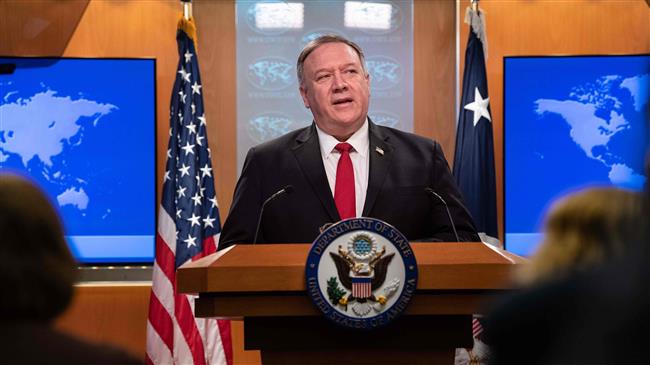In hawkish remarks, Pompeo threatens Iraq with more aggression 'if US forces attacked'
Secretary of State Mike Pompeo has threatened the Iraqi government with more acts of aggression if US troops in the Arab country remain a target for attacks, ignoring the fact that Washington has been occupying Iraq for many years and turning a blind eye to calls for a rapid withdrawal of US forces.
According to a statement issued on Monday by State Department spokeswoman Morgan Ortagus, Pompeo in a recent conversation with Iraqi Prime Minister Adel Abdul Mahdi had said Baghdad should defend the US-led coalition purportedly fighting the Daesh Takfiri terrorist group in Iraq.
The top US diplomat warned Iraq's premier that the United States would take measures in self-defense if attacked, the statement added.
"Secretary Pompeo underscored that the groups responsible for these attacks must be held accountable. Secretary Pompeo noted that America will not tolerate attacks and threats to American lives and will take additional action as necessary in self-defense," Ortagus said.
Pompeo spoke to the Iraqi premier on Sunday, a day after three US troops were wounded in a second major rocket attack in the past week on a base north of Baghdad.
The Pentagon said two of the three wounded US troops were seriously injured. The Iraqi military said several Iraqi air defense servicemen were also critically wounded.
Iraq's Joint Operations Command said 33 Katyusha rockets were launched near a section of the Taji base, which is located approximately 27 kilometers (17 miles) north of the capital Baghdad and houses US-led troops. It said the military found seven rocket launchers and 24 unused rockets in the nearby Abu Izam area.
On March 11, a similar rocket attack on Taji killed two US troops and a British soldier. No group has yet claimed responsibility for the attack, in which some 18 107-mm Katyusha rockets struck the US-occupied camp.
US President Donald Trump claimed that the attackers were a group that “most likely looked like it could be backed by Iran.” Tehran has dismissed the "baseless" remark.
On Thursday night, a day after the March 11 rocket attack, the US conducted a string of airstrikes that killed three Iraqi soldiers, two police officers and a civilian worker, and damaged an unfinished civilian airport.
The Iraqi military says the US strikes amount to a targeted act of aggression against Iraq’s armed forces and a violation of its sovereignty.
The Pentagon had said earlier on Friday that the strikes targeted five weapons stores used by Iraqi groups that “targeted US forces.” Iraqi resistance groups denied the accusations.
On January 3, US terrorist forces assassinated Lieutenant General Qassem Soleimani, commander of the Quds Force of the Islamic Revolution Guards Corps, and Abu Mahdi al-Muhandis, second-in-command of Iraq’s Popular Mobilization Units (PMU) in an airstrike.
The provocative, cowardly operation was the trigger for an even deeper anti-US sentiment in Iraq.
Iraqi groups have pledged to avenge the assassination and eventually drive the foreign troops out of the country.
Hassan al-Kaabi, the head of the Badr Organization’s parliamentary bloc, recently said in an exclusive interview that Iraq would adopt a different position on the presence of US and foreign military personnel on its soil if the troops refuse to withdraw.
VIDEO | Yemenis praise the military for its successful operations against Israel
VIDEO | Israel continues to bomb Gaza homes
VIDEO | An insider's view of the country: Meybod City in Yazd
‘All wars have rules. All of those rules have been broken’ by Israel
VIDEO | Report flags India’s violation of rights of Rohingya detainees
Turkey's foreign minister meets Syria's de facto leader in Damascus
VIDEO | US Syria plots
'Next to impossible' to rescue patients from Gaza's Kamal Adwan Hospital: Director













 This makes it easy to access the Press TV website
This makes it easy to access the Press TV website